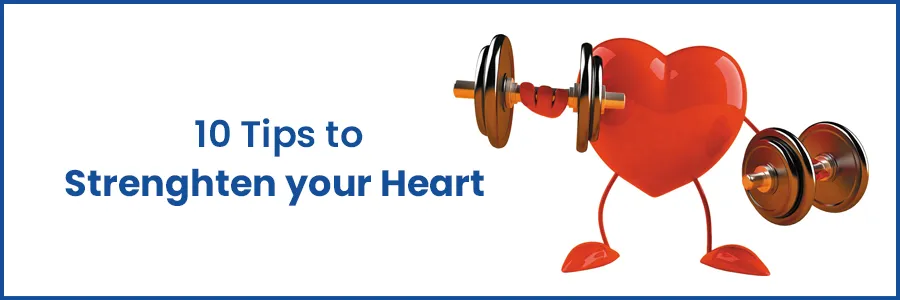10 Tips to Strenghten your Heart

The heart, our vital organ, serves as the lifeline that sustains our life. Responsible for pumping blood and nutrients throughout the body, the heart plays a central role in maintaining overall health and vitality. In today's fast-paced and often sedentary lifestyle, the importance of heart health cannot be overstated. Fortunately, there are numerous ways to strengthen your heart and promote its well-being.
In this comprehensive blog, we will explore essential strategies, lifestyle changes, and tips to empower your heart, ensuring a healthier and more fulfilling life. Understanding Heart Health
Before diving into the strategies to strengthen your heart, let's first understand what heart health entails. Heart health is a measure of the heart's efficiency in delivering oxygen and nutrients to the body's tissues and organs. It encompasses various aspects, including cardiovascular fitness, blood pressure, cholesterol levels, and overall heart function.
Maintaining good heart health is vital for preventing cardiovascular diseases, such as heart failure, heart attacks and strokes. Adopting a heart-healthy lifestyle can significantly reduce the risk of these conditions and enhance overall quality of life.
10 Tips to Strengthen Your Heart
- Regular Physical Activity: We Should Engage in regular physical activity is the most effective way to strengthen your heart. Aerobic exercises like walking, running, swimming, or cycling help improve cardiovascular fitness, lower blood pressure, and reduce the risk of heart disease. Aim for at least 120 minutes of moderate-intensity exercise or 70 minutes of vigorous-intensity exercise per week.
- Balanced Diet: A heart-healthy diet is crucial for optimal heart function. Emphasize a diet rich in fruits, vegetables, whole grains, lean proteins, and healthy fats. Limit the intake of saturated and trans fats, sodium, and added sugars. Incorporate heart-friendly foods like fatty fish (salmon, mackerel), nuts, seeds, and olive oil.
- Maintain a Healthy Weight: Obesity and excess weight put extra strain on the heart. Maintaining a healthy weight and balanced diet, regular exercise can significantly reduce the risk of heart disease.
- Quit Smoking: Smoking is a Big risk factor for heart disease. If you smoke, seek support to quit this habit. Quitting smoking reduces the big risk of heart disease and improves overall lung and heart health.
- Manage Stress: Chronic stress can contribute to heart problems. Practice stress-reduction techniques like meditation, deep breathing exercises, yoga, or spending time in nature to improve heart health.
- Get Quality Sleep: Adequate, restful sleep is essential for heart health. Aim for 8 hours of sleep per night to promote heart function and overall well-being.
- Limit Alcohol Intake: Excessive alcohol consumption can harm the heart. If you drink alcohol, do so in moderation. For women, this means up to one drink per day, and for men, up to two drinks per day.
- Regular Health Check-ups: Regular health check-ups can help identify and manage any underlying heart conditions or risk factors. Visit your healthcare provider for routine screenings and consultations.
- Stay Hydrated: Proper hydration is essential for heart health. Drink plenty of water throughout the day and limit the intake of sugary beverages.
- Limit Sodium Intake: High sodium consumption can raise blood pressure, straining the heart. Be mindful of sodium in processed foods and opt for low-sodium alternatives.Specific Foods for Heart Health Certain foods are particularly beneficial for heart health due to their unique nutritional properties.
- Oily Fish: Fatty fish like salmon, mackerel, and trout are rich in omega-3 fatty acids, which help reduce inflammation and improve heart health.
- Berries: Berries are packed with antioxidants, fiber, and vitamins that support heart health and reduce the risk of cardiovascular disease.
- Nuts and Seeds: Nuts like almonds, walnuts, and seeds like flax seeds and chia seeds are excellent sources of heart-healthy fats and fiber.
- Oats: Oats are high in soluble fiber, which can help lower LDL cholesterol levels, known as "bad" cholesterol.
- Leafy Greens: Leafy greens like spinach, kale, and Swiss chard are rich in vitamins, minerals, and antioxidants that benefit heart health.
- Avocado: Avocado is a great source of monounsaturated fats, which can help lower LDL cholesterol and promote heart health.
- Dark Chocolate: Dark chocolate with a high cocoa content contains flavonoids that may improve heart health by reducing inflammation and increasing blood flow.
The Role of Exercise in Heart Health
Physical activity plays a central role in strengthening the heart and improving cardiovascular fitness. Regular exercise has numerous benefits for heart health, including:
- Strengthening the heart muscle
- Improving circulation and blood flow
- Lowering blood pressure
- Increasing HDL cholesterol (the "good" cholesterol) and reducing LDL cholesterol (the "bad" cholesterol)
- Enhancing the efficiency of the heart's pumping action
- Reducing the risk of heart disease like heart attacks, and strokes
Aim to include a mix of aerobic exercises, strength training, and flexibility exercises in your fitness routine. Remember to start slowly, especially if you are new to exercise or have any underlying health conditions. Always consult your healthcare provider before starting a new exercise program, especially if you have any pre-existing heart conditions or health concerns.
Creating Heart-Healthy Habits Strengthening your heart is not just about making short-term changes, it's about adopting heart-healthy habits for life.
Here are some practical steps to create lasting heart-healthy habits:
- Set Realistic Goals: Always Start with small, achievable goals and gradually build on them. Celebrate your progress along the way.
- Be Consistent: Consistency is key to success. Establish a regular exercise routine and stick to a balanced diet.
- Make It Enjoyable: Choose physical activities and heart-healthy foods that you enjoy. This will increase your chances of maintaining these habits over the long term.
- Get Support: Share your heart-healthy journey with family or friends. Having a support system can be motivating and inspiring.
- Monitor Your Progress: Keep track of your exercise sessions, meals, and other heart-healthy activities. It will help you stay accountable and identify areas for improvement.
